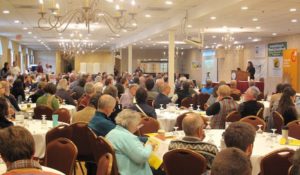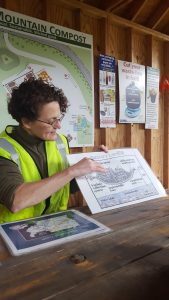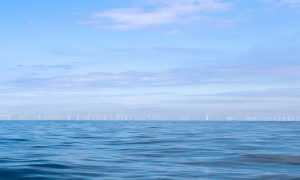This post was written by Henry Rabinowitz ’18
I had the chance to attend the Vermont Energy and Climate Action Network (VECAN) conference December 2 along with fellow Sustainable Innovation MBA candidate Sam Carey. The event, which has been held annually for the last ten years at the Lake Morey Resort in Fairlee, VT, offered a chance to meet and network with an eclectic group of activists, energy committee members, state employees, and business people, who are all working to solve the problem of climate change on a practical, local level here in Vermont.
 A large portion of the conference’s attendees were people serving on local energy committees — people looking for ways to identify action plans for their towns and communities to implement specific environmentally minded policies and improvements.
A large portion of the conference’s attendees were people serving on local energy committees — people looking for ways to identify action plans for their towns and communities to implement specific environmentally minded policies and improvements.
In the first session, I attended a panel on engaging low income communities with climate solutions, where representatives of three organizations promoting building and home weatherization and efficiency improvements presented their activities. After lunch, I went to a workshop focused on bringing together green energy and agriculture. Three representatives of the Vermont Agency for Agriculture Food & Markets presented on a variety of techniques for farmers to improve their energy efficiency, from installation of mixed use solar (where animals can graze alongside or under solar panels) and pollinator friendly solar installations (where a variety of native grasses and plants are included in a solar project) to biomass energy projects like large scale methane digesters and high-efficiency wood pellet and chip burning furnaces to replace oil heat in structures of varying size.
In my opinion, the most transformational element of the day’s activities was the keynote by former EPA head Gina McCarthy, who was impassioned, extraordinarily knowledgeable and, frankly hilarious—if you haven’t had a chance to hear her speak, I highly recommend finding one of her speeches online.
The day was a reminder to me of just how engaged Vermonters are with climate change, and how excited people you encounter here every day are about the opportunities that come with the challenges it brings.
Photo credit: VECAN

 The
The  However, he faced a number of issues in executing the Cape Wind vision. First, Gordon immediately ran into extreme and well-funded opposition from rich property owners along the coast who did not want to see their ocean view marred by wind turbines. People from the Koch Brothers to Bunny Mellon to Walter Cronkite joined forces behind the Alliance to Protect Nantucket Sound (APNS): a NIMBY (not-in-my-backyard) group flush with cash and influence who set out to discredit Gordon and undercut the validity of the Cape Wind project. Second, Cape Wind faced prominent political opposition. The influence and connections of the APNS board members wreaked havoc for Cape Wind’s political standing and extensive lobbying efforts damaged the progress of what would have otherwise been a highly embraced endeavor. Finally, Cape Wind was an expensive undertaking – one whose fluctuations in cost had significant impact on its timeline.
However, he faced a number of issues in executing the Cape Wind vision. First, Gordon immediately ran into extreme and well-funded opposition from rich property owners along the coast who did not want to see their ocean view marred by wind turbines. People from the Koch Brothers to Bunny Mellon to Walter Cronkite joined forces behind the Alliance to Protect Nantucket Sound (APNS): a NIMBY (not-in-my-backyard) group flush with cash and influence who set out to discredit Gordon and undercut the validity of the Cape Wind project. Second, Cape Wind faced prominent political opposition. The influence and connections of the APNS board members wreaked havoc for Cape Wind’s political standing and extensive lobbying efforts damaged the progress of what would have otherwise been a highly embraced endeavor. Finally, Cape Wind was an expensive undertaking – one whose fluctuations in cost had significant impact on its timeline.
 The Summit was sponsored by the
The Summit was sponsored by the 
 Tidal Energy Company Atlantis is the largest of its kind in Europe. And right now it is focusing on completing a four phased MeyGen Tidal Energy Project in coasts of Scotland. The project is one of a kind Multi Turbine Tidal Energy field that will be powering nearly 175,000 Scotland houses after its completion. Right now the project is in the first phase of its development but it has already received a funding of €37 million from EU for its second phase.
Tidal Energy Company Atlantis is the largest of its kind in Europe. And right now it is focusing on completing a four phased MeyGen Tidal Energy Project in coasts of Scotland. The project is one of a kind Multi Turbine Tidal Energy field that will be powering nearly 175,000 Scotland houses after its completion. Right now the project is in the first phase of its development but it has already received a funding of €37 million from EU for its second phase. When the US president, Donald Trump, announced his intention to withdraw from the Paris climate agreement, one might have anticipated a hearty cheer from industry around the world relieved that business as usual could continue.
When the US president, Donald Trump, announced his intention to withdraw from the Paris climate agreement, one might have anticipated a hearty cheer from industry around the world relieved that business as usual could continue. Desalination is an important component of Singapore’s water supply – and the island country has a new desalination plant in the works decked out with green features. The large-scale facility can treat both freshwater and saltwater, and according to Today Online and other local news outlets, it’s thought to be the first one of its kind in the world.
Desalination is an important component of Singapore’s water supply – and the island country has a new desalination plant in the works decked out with green features. The large-scale facility can treat both freshwater and saltwater, and according to Today Online and other local news outlets, it’s thought to be the first one of its kind in the world. In a huge warehouse just outside downtown Los Angeles, a startup turns recycled shipping containers into vertical farms. A new digital tour shows what the farms, which are each equivalent in size to a four-acre outdoor field, look like inside.
In a huge warehouse just outside downtown Los Angeles, a startup turns recycled shipping containers into vertical farms. A new digital tour shows what the farms, which are each equivalent in size to a four-acre outdoor field, look like inside.